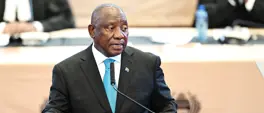ConCourt says Zuma's presidential remission didn't impact his prison sentence
Bernadette Wicks
20 May 2024 | 10:09The Constitutional Court on Monday upheld the Independent Electoral Commission of South Africa (IEC)’s appeal against the Electoral Court’s ruling giving the former president’s bid for public office in the upcoming elections the thumbs up, despite the 15 months in prison he got for contempt in 2021.
JOHANNESBURG - The Constitutional Court says the Presidential remission under which Jacob Zuma got out of prison early did not impact the sentence he received.
The Constitutional Court on Monday upheld the Independent Electoral Commission of South Africa (IEC)’s appeal against the Electoral Court’s ruling giving the former president’s bid for public office in the upcoming elections the thumbs up, despite the 15 months in prison he got for contempt in 2021.
Under the Constitution, anyone found guilty of a crime and sentenced to 12 months or more - without the option of a fine - is disqualified from sitting in the National Assembly, for five years. In its ruling, the apex court found the Electoral Court was mistaken when it found the Presidential remission Zuma got had the legal effect of reducing his sentence to below this threshold.
ALSO READ: Elections 2024: Zuma can't stand as a candidate, rules Constitutional Court
In a unanimous ruling handed down by Justice Leona Theron, the Constitutional Court held that the effect of a remission of sentence was “to bring forward a person’s date of release” - and that it concerned “the execution of the sentence”.
The court found, however, that it did not “retrospectively alter the sentence imposed”.
The Electoral Court also found that because Zuma’s sentence was handed down by the apex court and he couldn’t appeal, it wasn’t the kind contemplated in the relevant provisions - which state that a person is only disqualified in terms thereof, after all appeals.
However again, the apex court disagreed.
It found that the disqualification was “aimed at maintaining the integrity of South Africa’s democratic regime, which is founded on the rule of law, by ensuring members of Parliament possess the requisite respect for the rule of law” - and that the provision was only there to ensure the appeals process was finalised first.
Get the whole picture 💡
Take a look at the topic timeline for all related articles.














